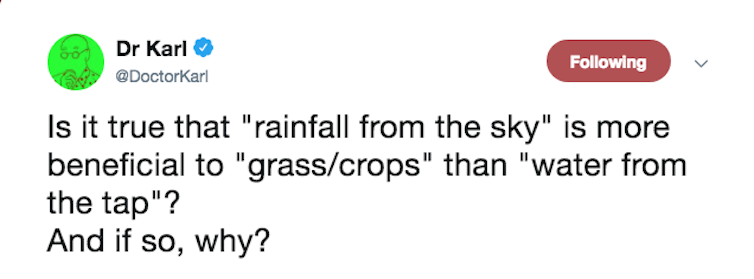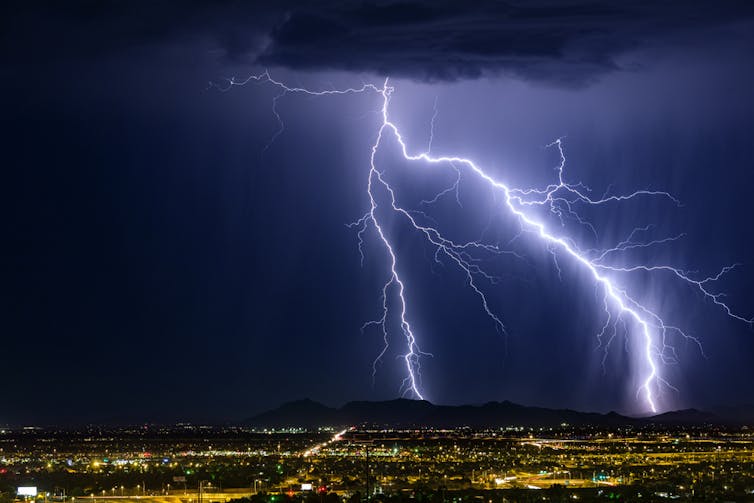is rain better than tap water for plants?
- Written by Ian Wright, Senior Lecturer in Environmental Science, Western Sydney University
This is an article from I’ve Always Wondered, where readers send in questions they’d like an expert to answer. Send your question to alwayswondered@theconversation.edu.au
 You might have noticed how bright green your plants look after rain. Or you may have been watering your garden this summer, over many hot days and weeks.
So, which water is best for your plants? The stuff that falls out of the sky or the water that comes out of the tap?
You might be surprised to find that rain, especially during a thunderstorm, has special qualities that can give your plants a boost.
Read more:
Why does some tap water taste weird?
Lightning can be a tonic
This summer, much of the east coast of Australia has been affected by a series of intense summer thunder storms. A rare combination of events saw thunderstorms stretch from North Queensland to Tasmania. Tropical cyclone Penny also caused very heavy rain in far north Queensland.
Although winds and hail can damage a garden, rain during thunder storms can be particularly special for plants. That’s because lightning helps add nitrogen to your garden.
It’s about the nitrogen
Australian soils are notoriously poor in nutrients and nitrogen is no exception. Plants crave nitrogen for a range of reasons, in particular to produce chlorophyll, the green photosynthetic pigment. If plants are deficient in nitrogen, they might look yellowish. If the nitrogen levels are very low for extended periods of time plants might be stunted, get sick or die.
Nitrogen makes up about 78% of the atmosphere but plants cannot access it directly from the sky as it takes too much energy to turn it into a form they can actually use.
Instead, plants can get their nitrogen from other sources, in processes scientists broadly refer to as nitrogen fixation.
Nitrogen can come from added fertilisers, the decomposition of organic matter in the soil, and organisms that can break down atmospheric nitrogen into something usable.
Plants can also get their nitrogen from high-energy processes in the atmosphere, like solar radiation and lightning, which is where summer storms come in.
You might have noticed how bright green your plants look after rain. Or you may have been watering your garden this summer, over many hot days and weeks.
So, which water is best for your plants? The stuff that falls out of the sky or the water that comes out of the tap?
You might be surprised to find that rain, especially during a thunderstorm, has special qualities that can give your plants a boost.
Read more:
Why does some tap water taste weird?
Lightning can be a tonic
This summer, much of the east coast of Australia has been affected by a series of intense summer thunder storms. A rare combination of events saw thunderstorms stretch from North Queensland to Tasmania. Tropical cyclone Penny also caused very heavy rain in far north Queensland.
Although winds and hail can damage a garden, rain during thunder storms can be particularly special for plants. That’s because lightning helps add nitrogen to your garden.
It’s about the nitrogen
Australian soils are notoriously poor in nutrients and nitrogen is no exception. Plants crave nitrogen for a range of reasons, in particular to produce chlorophyll, the green photosynthetic pigment. If plants are deficient in nitrogen, they might look yellowish. If the nitrogen levels are very low for extended periods of time plants might be stunted, get sick or die.
Nitrogen makes up about 78% of the atmosphere but plants cannot access it directly from the sky as it takes too much energy to turn it into a form they can actually use.
Instead, plants can get their nitrogen from other sources, in processes scientists broadly refer to as nitrogen fixation.
Nitrogen can come from added fertilisers, the decomposition of organic matter in the soil, and organisms that can break down atmospheric nitrogen into something usable.
Plants can also get their nitrogen from high-energy processes in the atmosphere, like solar radiation and lightning, which is where summer storms come in.
 Rainfall during a thunderstorm can help plants unlock nitrogen from the atmosphere.
from www.shutterstock.com
The enormous heat and pressure that lightning generates provides enough energy to break down and convert atmospheric nitrogen into a number of reactive nitrogen species. When mixed with oxygen and water in the atmosphere the resulting rainfall will contain greater levels of nitrates and ammonium.
For over a billion lightning flashes around the globe each year, 2 billion kilograms of reactive nitrogen is produced.
Read more:
Carbon catch-22: the pollution in our soil
The total amount of nitrogen in rainfall varies depending on where you live and the season. A coastal region that is subject to industrial activity may have greater nitrogen deposition.
Once the rain drops reach the ground they deposit ammonium and nitrates that can be used by plants, whilst bacteria and fungi in the soil can further transform the available nitrogen in a process known as nitrification.
So, if you have had wet summer thunderstorms roll over your property, not only will your plants have had a good watering, they will have had a top up of nitrogen.
How about other factors?
Comparing tap water, that is supplied as treated drinking water, with rainwater that falls outside of summer storms can be tricky. That’s because some tap water is more alkaline (a higher pH) or saltier (have a higher ionic strength) than others. Prolonged watering with water that has a higher levels of chloride (and to a lesser extent, fluoride) can also stop the plant from taking up available nitrate. Plants can also be harmed by the surprisingly high levels of sodium in some drinking water supplies.
Read more:
Your drinking water could be saltier than you think (even if you live in a capital)
Processed drinking water is almost always a poor source of nitrate. There is a very good reason for this. Water authorities all seek to minimise the nitrate content of drinking water, because high concentrations can be dangerous for babies and trigger blue baby syndrome.
Most gardeners want a slightly acidic pH because it makes nutrients more available for plants and is better for overall soil health. Here, rainwater might be your friend (pH 5.6). Tap water is more alkaline (between pH 6-8.5) depending on where your drinking water is sourced. So certain tap waters can work against you and your plants.
Read more:
Better boil ya billy: when Australian water goes bad
In a nutshell:
So what kind of water should you use on your plants, if you have the choice? Here’s the order, in best to worst:
rainwater following a thunderstorm,
clean rainwater,
river water,
low-ionic tap water,
high-ionic tap water, and
bore water (can be salty).
There are also other reasons why plants sometimes look greener after rain. It can also be from the rain washing dust from plants. This is quite plausible given the dust storms in recent weeks.
Rainfall during a thunderstorm can help plants unlock nitrogen from the atmosphere.
from www.shutterstock.com
The enormous heat and pressure that lightning generates provides enough energy to break down and convert atmospheric nitrogen into a number of reactive nitrogen species. When mixed with oxygen and water in the atmosphere the resulting rainfall will contain greater levels of nitrates and ammonium.
For over a billion lightning flashes around the globe each year, 2 billion kilograms of reactive nitrogen is produced.
Read more:
Carbon catch-22: the pollution in our soil
The total amount of nitrogen in rainfall varies depending on where you live and the season. A coastal region that is subject to industrial activity may have greater nitrogen deposition.
Once the rain drops reach the ground they deposit ammonium and nitrates that can be used by plants, whilst bacteria and fungi in the soil can further transform the available nitrogen in a process known as nitrification.
So, if you have had wet summer thunderstorms roll over your property, not only will your plants have had a good watering, they will have had a top up of nitrogen.
How about other factors?
Comparing tap water, that is supplied as treated drinking water, with rainwater that falls outside of summer storms can be tricky. That’s because some tap water is more alkaline (a higher pH) or saltier (have a higher ionic strength) than others. Prolonged watering with water that has a higher levels of chloride (and to a lesser extent, fluoride) can also stop the plant from taking up available nitrate. Plants can also be harmed by the surprisingly high levels of sodium in some drinking water supplies.
Read more:
Your drinking water could be saltier than you think (even if you live in a capital)
Processed drinking water is almost always a poor source of nitrate. There is a very good reason for this. Water authorities all seek to minimise the nitrate content of drinking water, because high concentrations can be dangerous for babies and trigger blue baby syndrome.
Most gardeners want a slightly acidic pH because it makes nutrients more available for plants and is better for overall soil health. Here, rainwater might be your friend (pH 5.6). Tap water is more alkaline (between pH 6-8.5) depending on where your drinking water is sourced. So certain tap waters can work against you and your plants.
Read more:
Better boil ya billy: when Australian water goes bad
In a nutshell:
So what kind of water should you use on your plants, if you have the choice? Here’s the order, in best to worst:
rainwater following a thunderstorm,
clean rainwater,
river water,
low-ionic tap water,
high-ionic tap water, and
bore water (can be salty).
There are also other reasons why plants sometimes look greener after rain. It can also be from the rain washing dust from plants. This is quite plausible given the dust storms in recent weeks.
Authors: Ian Wright, Senior Lecturer in Environmental Science, Western Sydney University
Read more http://theconversation.com/ive-always-wondered-is-rain-better-than-tap-water-for-plants-109714





